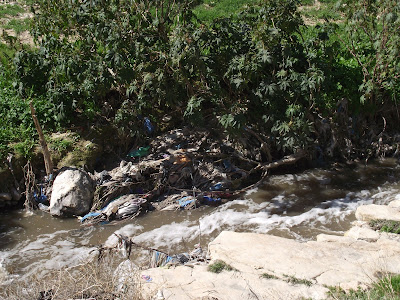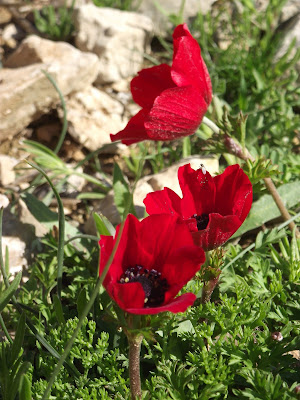At the end of Pessach (in April) we travelled to Jordan for 4 days and were impressed by the beauty of nature and the friendliness and hospitality of the people. On this short trip, our first visit to Jordan, we visited Wadi Rum, Petra and the Dana Nature Reserve.
We had to postpone our trip by 2 days due to heavy thunderstorms in the desert and already on the bus ride from Tel Aviv to Eilat we saw how even roads in the Negev was flooded. From the bus stop before Eilat we walked to the Arava border crossing where we had to pay an exit fee on the Israeli side before walking through a big gate welcoming us to the Hashemite Kingdom of Jordan. There we presented our Jordan pass that includes entrance to many sites incl. Petra and replaces the visa fee if you stay at least 3 nights in Jordan - highly recommended!
It is a friendly border between two neighbour states with a peace agreement, but still it is a real border that made me once more appreciate the border-free travelling in Europe.
On the Jordanian side we were picked up by a driver organised by Bedouin Roads, our destination in Wadi Rum. On the way we already saw camels :
In the next posts I will tell more about the camel ride and hikes in Wadi Rum, the Nabatean town of Petra and the hike in the Dana Reserve - with pictures.
Samstag, 27. Mai 2017
Samstag, 18. Februar 2017
Mar Saba
Today we hiked in the Westbank: from the Jerusalem's outskirts to the viewpoint on Jabal Muntir (Mount Azalzel), trough the Kidron Valley to the Greek-orthodox monastery of Mar Saba and the fortress of Hyrcania before descending the Hyrcania Valley. It was a wonderful trip organised by Finjan.
We saw the change of the landscape with green grass into the desert (which is now in February after a lot of rain even a bit green) and had a view down to the Dead Sea, Jericho and the Jordanian mountains.
Beyond the beauty, we also saw the shocking reality in the Westbank with our own eyes: settlements extend deeper and deeper into Palestinian land whereas the Bedouins live in poverty with their sheep and donkeys. Some children even begged for food and money.
With so little water sources in the area, it is irresponsible that the Kidron stream that carries water around the year is full of garbage transported there from higher altitudes e.g. from Bethlehem, Jerusalem and settlements. As a consequence, it has a disgusting smell, is not potable and not even usable for agriculture.
We saw the change of the landscape with green grass into the desert (which is now in February after a lot of rain even a bit green) and had a view down to the Dead Sea, Jericho and the Jordanian mountains.
Beyond the beauty, we also saw the shocking reality in the Westbank with our own eyes: settlements extend deeper and deeper into Palestinian land whereas the Bedouins live in poverty with their sheep and donkeys. Some children even begged for food and money.
With so little water sources in the area, it is irresponsible that the Kidron stream that carries water around the year is full of garbage transported there from higher altitudes e.g. from Bethlehem, Jerusalem and settlements. As a consequence, it has a disgusting smell, is not potable and not even usable for agriculture.
 |
| In front of the monastery |
 |
| Kidron valley |
 | |
| Nearby settlements seen from Bedouin place |
 | |
| A green valley in February |
 | |
| Donkey belonging to the Bedouins |
 | |
| Bedouin camp |
 | |
| Sheep of Bedouins, settlements close | -by |
 | |
| Bedouin shepherd |
 | |
| Dirty Kidron stream |
 | |
| Kalaniot: flowers in the desert |
 | |
| Blossoms of almond tree |
 |
| Mar Saba |
 | |
| Bedouin camp |
 |
| Mar Saba: women not allowed to enter |
 | |
| Aquaeduct towards Hyrcania fortress |
 |
| Floor mosaic at Hyrcania fortress |
 | |
| Hyrcania valley in front of Dead Sea |
Abonnieren
Kommentare (Atom)



